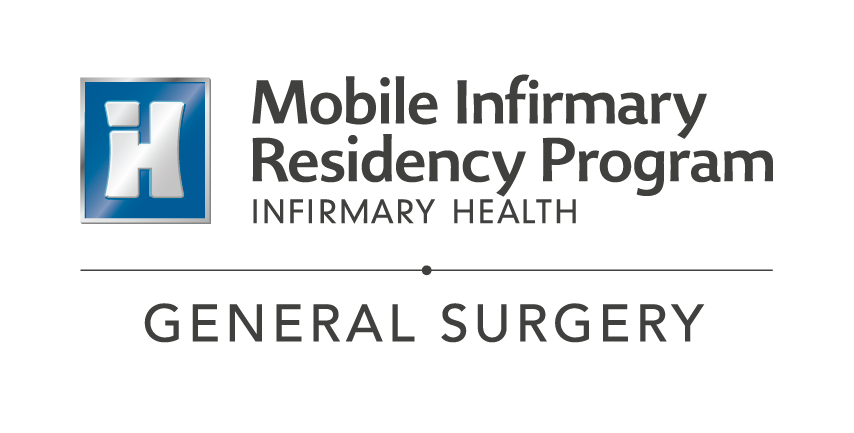Mobile Infirmary General Surgery Residency
The goal of the Mobile Infirmary General Surgery Residency Program is to educate general surgery physicians to treat all patients with a focus on LIFE (Leadership, Integrity, Family, and Excellent Service) through the practice of evidence-based surgical care. Our program aims to graduate capable, experienced general surgeons who are lifelong learners committed to serving others with excellence and compassion.

The program’s leadership and faculty guide residents beyond the initial expectations of mastery. As training commences, residents will collaborate closely with surgeons in both the office and operating suite. Our objective is to produce confident, competent, and compassionate general surgeons who will be lifelong learners and steadfast advocates for their patients.
The Mobile Infirmary General Surgery Residency offers three categorical positions annually.
What to expect
Over the course of five years, residents will perform over 1,000 surgical cases, spanning a diverse range of specialties such as alimentary tract, bariatrics, the abdomen and its contents, breast, skin and soft tissue, endocrine system, pediatric surgery, surgical critical care, surgical oncology, trauma and emergency surgery, thoracic, and vascular surgery.
To complement clinical training, the didactic curriculum encompasses instruction in fundamental surgical scientific and clinical principles, including but not limited to the following:
- Wound healing
- Shock and circulatory physiology
- Surgical infection
- Hematologic disorders
- Immunology and immunosuppression
- Transplantation
- Oncology
- Surgical endocrinology
- Surgical nutrition, fluid, and electrolyte balance
- Metabolism
- Physiologic response to injury, including burn physiology
Additionally, residents participate in mandatory medical education (M&M), basic science, journal club, Breast and Cancer Conference, and undertake a quality improvement or research project annually.
The initial year of residency commences with Boot Camp, where the PGY-1residency undergoes comprehensive training in ultrasound and bedside procedures, encompassing arterial lines, central lines, intubation, biopsy, aspiration, incision, and drainage. Furthermore, residents practice fundamental suturing techniques, bowel anastomosis, vascular anastomosis, and laparoscopic suturing. Robotic simulation training is also introduced during the first year.
The first year comprises four-week block rotations, with one block dedicated to breast surgery, anesthesia, plastics, and two blocks of surgical night float and colorectal surgery. Additionally, three blocks each are allocated to surgical oncology and general surgery.
PGY-2 includes one block each in colorectal surgery, vascular surgery, surgical oncology, night float, thoracic surgery, SICU-critical care, pediatric surgery at Children’s of Alabama in Birmingham, and burn and critical care at the University of Alabama at Birmingham. The remaining three blocks are focused on general surgery.
The third year involves one block in endoscopy, night float, breast surgery, thoracic surgery, orthopedic surgery, colorectal surgery, vascular surgery, and trauma surgery at DCH Regional Medical Center in Tuscaloosa. Two blocks are dedicated to surgical oncology, and three blocks are allocated to general surgery.
The fourth year includes a trauma surgery block at DCH Regional Medical Center in Tuscaloosa, two breast surgery blocks and surgical oncology blocks, and two elective blocks. The remaining seven blocks are dedicated to general surgery.
In the final year, residents assume the role of chief for one block in vascular and thoracic surgery, two blocks in colorectal surgery, three blocks in surgical oncology, and six blocks in general surgery.
Unless otherwise noted, all surgical blocks will take place at Mobile Infirmary.
For questions, please contact us at Mobile.GSresidency@infirmaryhealth.org.
About Mobile Infirmary
Mobile Infirmary, Infirmary Health’s flagship hospital, has led healthcare in the Gulf Coast region since 1910. Today, physicians at the hospital perform more than 20,000 operations yearly, and their dedication to continued innovation maintains the hospital’s position as a surgical leader in the state. Mobile Infirmary was the first hospital in the region to offer robotic surgery through the da Vinci robotic surgery system, and its surgeons have performed over 20,000 robotic procedures. Today, Infirmary Health offers more robotic surgical services than any system in the region with six da Vinci robots at Mobile Infirmary, three at Thomas Hospital, and one at North Baldwin Infirmary.
Mobile Infirmary boasts a 681-bed facility that serves as the region’s healthcare leader and offers groundbreaking innovations in technology and medical services. As the largest non-governmental, not-for-profit healthcare system in the state, Infirmary Health serves all counties in southern Alabama, as well as southern Mississippi and the Florida panhandle. With more than 700 doctors on the medical staff and some 6,700 other team members, Infirmary Health treats more than 1.7 million patients per year. At Mobile Infirmary, members of the medical staff represent all internal medicine subspecialties. Infirmary Health is also a strategic partner of the University of Alabama at Birmingham Health System and the O’Neal Comprehensive Cancer Center.
Click here to learn more about Mobile Infirmary's award-winning services.



